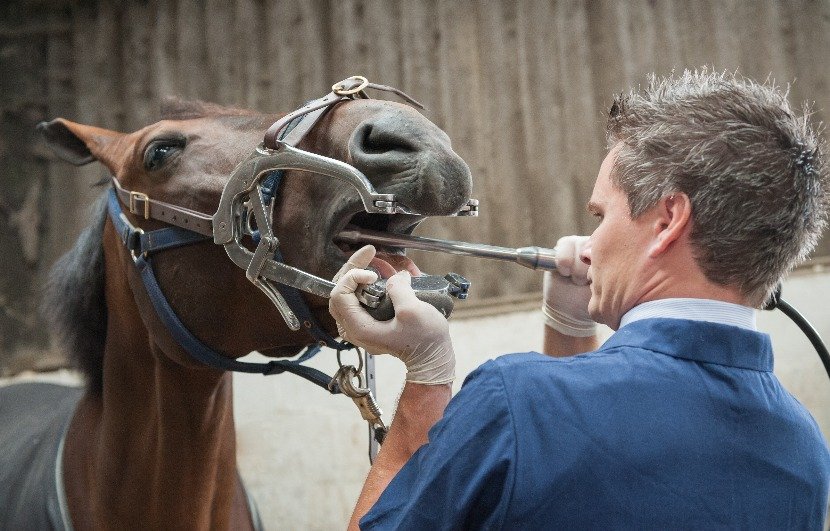When we think about horse care, we often focus on feeding, exercise, hoof care, and veterinary visits. But there’s another critical area of equine health that often goes overlooked—dental care.
Just like with people, dental health in horses affects everything from how well they eat to how they perform. A horse with dental issues may struggle with chewing, lose weight, act out under saddle, or even develop infections. The good news? Most dental problems can be prevented or managed with regular care.
In this article, we’ll explore why dental check-ups are essential, what signs to watch for, and how to stay ahead of the most common equine dental issues.
Why Equine Dental Care Matters

Horses are natural grazers, designed to chew fibrous plants for most of the day. Their teeth grow (or “erupt”) continuously to make up for this constant wear. But in our modern world of stabled feeding and processed hay, horses don’t always grind their teeth evenly—and that can lead to trouble.
Uneven wear, sharp points, and dental imbalances can cause pain, ulcers, infections, and digestion problems. Horses with unmanaged dental issues may:
- Drop feed or chew slowly
- Lose weight despite a healthy appetite
- Toss their heads or resist the bit
- Show mood changes or sensitivity when handled
Regular dental care helps prevent these issues, keeps your horse comfortable, and ensures they get the full nutritional benefit from their feed.
How Often Should a Horse See the Equine Dentist?
As a general rule, horses should receive a dental check at least once a year. Some horses—especially seniors or those with known issues—may need checks every six months.
Routine dental exams allow your veterinarian or equine dental technician to:
- Float (file down) sharp enamel points
- Correct uneven or abnormal wear patterns
- Identify loose, fractured, or infected teeth
- Check for gum disease or abscesses
- Monitor the alignment of molars and incisors
It’s always better to catch problems early than wait for them to cause visible discomfort or weight loss.
Common Dental Issues in Horses
Equine dental problems can range from mild to severe, and often develop gradually. Here are some of the most common conditions to be aware of:
1. Sharp Enamel Points
Because horses chew in a circular motion, uneven wear can create sharp edges—usually on the outside of the upper molars and the inside of the lower molars. These points can dig into the cheeks and tongue, causing painful ulcers.
Symptoms:
- Dropping feed (quidding)
- Excessive salivation
- Head tilting while chewing
- Bit resistance
2. Hooks and Ramps
When the teeth at the front or back of the dental arcade don’t align properly, they can develop hooks (forward-pointing growths) or ramps (excessive slope). These conditions limit the horse’s jaw movement and can worsen over time.
Symptoms:
- Difficulty chewing
- Poor performance
- Pain when flexing or collecting under saddle
3. Wave Mouth
This condition occurs when the molar row develops a wavy, uneven pattern due to improper wear. Over time, it leads to inefficient chewing and can cause long-term damage to the teeth and jaw.
Wave mouth is more common in older horses and can require repeated adjustments over time.
4. Step Mouth
If a tooth is missing or severely worn, the opposing tooth may overgrow due to lack of contact. This results in a step-like pattern that disrupts normal chewing and leads to more abnormal wear.
5. Tooth Root Abscesses
Infections at the root of a tooth can cause swelling in the jaw or face, nasal discharge, and severe discomfort. These may require tooth extraction, long-term antibiotics, and careful monitoring.
6. Diastemas (Gaps Between Teeth)
Food can get trapped between teeth that are spaced too far apart, leading to gum inflammation and even periodontal disease. Horses with diastemas often have bad breath or show discomfort while chewing.
Dental Care for Foals and Young Horses
Dental care isn’t just for older horses. Foals and young horses can experience problems as their baby teeth (caps) fall out and permanent teeth erupt. Some may retain caps too long or experience misalignment.
For horses in training or beginning bit work, dental exams are especially important to ensure comfort and proper development.
Dental Care for Senior Horses
Senior horses (ages 15+) often face increased dental challenges, such as:
- Loose or missing teeth
- Uneven wear
- Reduced chewing efficiency
- Increased risk of infections or gum disease
Softened feeds, hay pellets, or complete senior feeds may help these horses get proper nutrition when chewing becomes difficult. More frequent dental exams—every 6 months—are often recommended.
Tips for At-Home Monitoring
While only a vet or dental technician can perform thorough dental work, horse owners play a big role in spotting issues early. Watch for:
- Changes in eating habits
- Feed in water buckets
- Excessive drooling or bad breath
- Head tossing or resisting contact under saddle
- Unexplained weight loss or lack of muscle
If you suspect a problem, don’t wait—schedule a dental exam right away.
Final Thoughts
Dental care isn’t just a checkmark on your horse care list—it’s a cornerstone of overall wellness. A comfortable mouth means better chewing, better digestion, and better behavior. It can even help improve performance and extend your horse’s active years.
The best part? Preventative dental care is simple, affordable, and effective. When done regularly, it can spare your horse from pain and help you avoid costly emergencies down the road.




